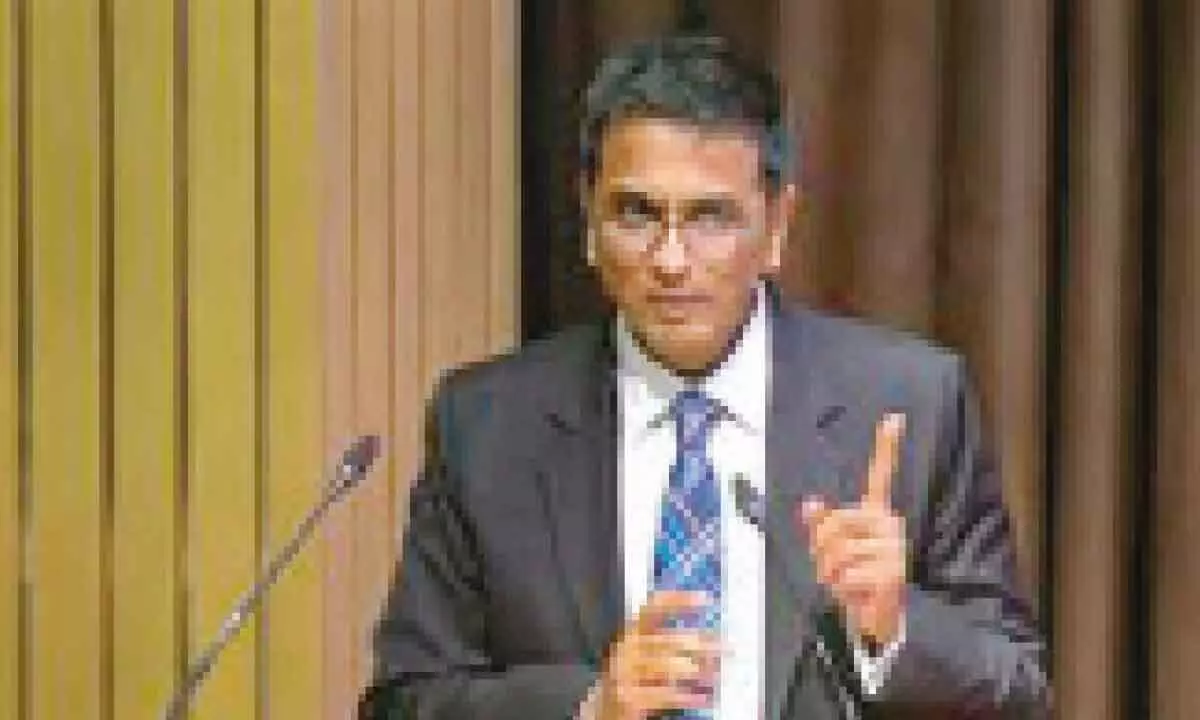Live
- All you need to know about PAN 2.0
- Akasa Air redefines travel experience with industry-first offerings
- MP: Residents stage protests against liquor shop in Indore
- Telugu Actor Shri Tej Booked for Alleged Cheating and False Promise of Marriage in Live-in Relationship
- Toyota Kirloskar Motor Celebrates 1 Lakh Urban Cruiser Hyryder on Indian Road
- MLS: New York City FC part ways with head coach Nick Cushing
- Delhi CM says Centre cutting AAP voters’ names from rolls, BJP hits back
- Hyderabad Metro Rail Phase-II Works to Begin in Old City in January 2025
- Odisha: 668 persons killed in human-elephant conflicts in last three years
- DEFENDER JOURNEYS: TO EMBARK ON ITS THIRD EDITION FROM NOVEMBER 2024
Just In
Ensure arbitration institutions aren’t controlled by self-perpetuating clique


Chandrachud says now is the time for countries such as India to step up to the occasion to create and promote a culture of commercial arbitration and the robust institutionalisation of arbitration will further the culture of arbitration in the Global South.
Mere creation of arbitration institutions is not sufficient and we have to ensure that these dispute resolution hubs are not controlled by a “self-perpetuating clique”, Chief Justice D Y Chandrachud has said.
Speaking at the Supreme Court of the United Kingdom, Chandrachud said now is the time for countries such as India to step up to the occasion to create and promote a culture of commercial arbitration and the robust institutionalisation of arbitration will further the culture of arbitration in the Global South.
He said arbitration is an alternative method of dispute resolution and it is no longer an “alternative” but the preferred method of seeking commercial justice. “In recent years, institutions such as India International Arbitration Centre and Mumbai and Delhi International Arbitration Centers have been set up and are seeing a steady flow of arbitration matters,” the CJI said. “But the mere creation of institutions is not sufficient. We have to ensure that these new institutions are not controlled by a self-perpetrating clique. These institutions must be based on the foundation of robust professionalism and the ability to generate consistent arbitral processes,” he added.
The CJI said transparency and accountability, values by which the work of conventional courts is assessed and critiqued, cannot be alien to the world of arbitration.
“Arbitral institutions are uniquely placed to cooperate with other arbitral institutions around the world to adopt best international practices and procedures. This will create a global convergence of arbitral procedures, creating more uniform institutional rules and structures. I hope the Indian arbitral institutions emulate the success of their global counterparts in the years to come,” he added.
Reiterating that substitution of courts should not result in the creation of opaque structures, Chandrachud said the plea for bringing greater diversity in the world of arbitration is based on the firm belief that bringing a diversity of viewpoint to the world of arbitration whether in terms of gender or from the Global South will make for a broad-based process. Stressing on the role of technology in the arbitration process, the CJI said technology plays a major role in how the arbitration proceedings are being carried out and offers cost-effective and time-effective solutions.
“You have instances where one party is based in Delhi, another in Bengaluru, while the arbitrators are in London, Mumbai and Singapore. Technology provides the digital environment allowing them to participate in arbitral proceedings virtually,” the CJI said. “As in law courts, Covid-19 provided an impetus to modernising the arbitral process.
Likewise, the world of arbitration impacted on the processes adopted by courts as well,” he added. Chandrachud said adoption of technology at all levels of arbitration proceedings will make the arbitration proceedings more efficient and, importantly, more accessible.
“Technology and artificial intelligence add value to the services provided by arbitral institutions in matters such as reviewing documents or transcribing the proceedings,” he said.

© 2024 Hyderabad Media House Limited/The Hans India. All rights reserved. Powered by hocalwire.com






